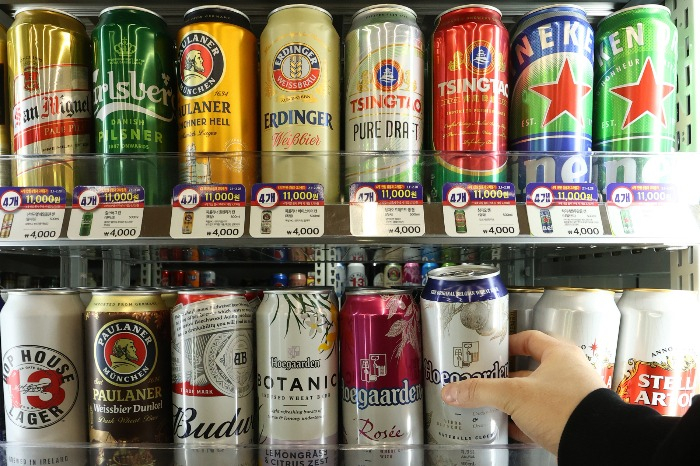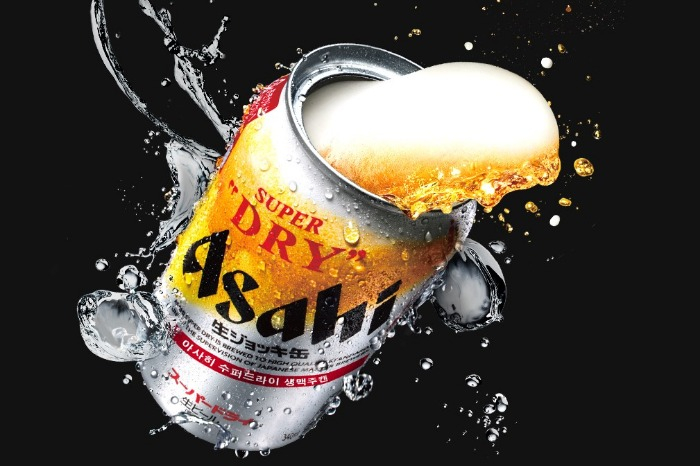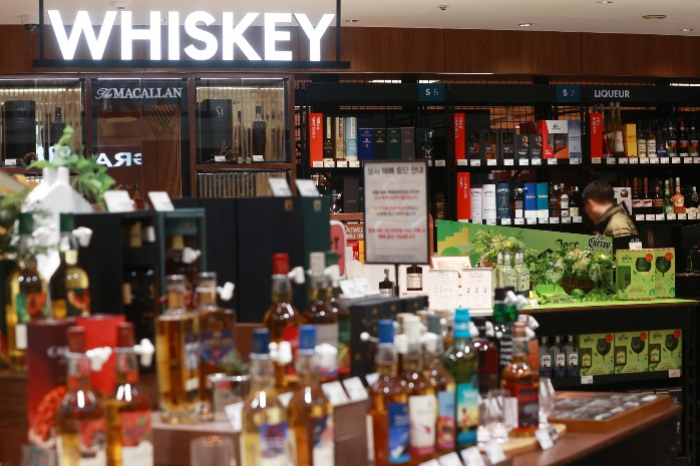Food & Beverage
Cooling demand sparks layoffs at Korean spirits importers
Local liquor importers such as Heineken Korea and Diageo Korea are reducing staff to fight falling profits
By Feb 19, 2024 (Gmt+09:00)
3
Min read
Most Read
LG Chem to sell water filter business to Glenwood PE for $692 million


KT&G eyes overseas M&A after rejecting activist fund's offer


Kyobo Life poised to buy Japan’s SBI Group-owned savings bank


StockX in merger talks with Naver’s online reseller Kream


Meritz backs half of ex-manager’s $210 mn hedge fund



Dwindling demand for foreign beers and whiskeys in South Korea has led some local liquor importers to let go of some staff, spurring concerns about whether mass layoffs are headed for the country’s spirits industry.
According to the local alcoholic beverage industry on Monday, Heineken Korea, the Korean importer of Dutch multinational brewing company Heineken N.V.’s beers, recently decided to lay off 3% to 4% of its total 160 employees this year.
“The company is reorganizing its business to improve competitivity to respond promptly to changes in drinkers’ consumption patterns,” said an official of Heineken Korea.
The job cut comes after the Dutch beer lost ground to Japanese rivals in Korea as overall demand for imported beers has been on a downward spiral in the country in recent years, according to market analysts.
Heineken and other beers from the Netherlands firmly remained Koreans’ most loved foreign beer brands until 2021 but last year were toppled by the triumphant return of Japanese brands led by “Asahi Super Dry Nama Jokki Kan,” the hyped foam-generating canned beer product.

Heineken fell to the No. 3 foreign beer brand in Korea, trailing No. 1 Asahi and runner-up China’s Tsingtao in 2023.
Worse yet, Koreans’ appetite for exotic beers has also been steadily declining in recent years.
According to the Korea Customs Service, the country’s beer imports dropped to 228,747 tons in 2022 from 387,981 tons in 2018. Korea imported 238,695 tons of beer in 2023.
“Considering that the country’s beer imports hit a record low in 2022, last year’s rebound was not worthy of attention,” said an official in the Korean liquor industry.
Heineken Korea hiked the average selling price of its beers, including Heineken, by 11% last year to improve profitability but the industry expects the company to report worse earnings for 2023 than for the year earlier.
In 2022, its operating profit decreased 27.7% on-year to 12.9 billion won ($9.7 million).
BK Co., the Korean importer of Tsingtao beers, already asked some of its employees to take voluntary early retirement in November last year.
BOOM AND BUST
The Korean whiskey market, which heavily relies on import brands, also shows signs of repeating the wine market’s boom-and-bust cycle.

The country’s No. 1 whiskey importer Diageo Korea is currently offering employees with 10 or more years of service early retirement deals. Employees are eligible for an early retirement package of severance pay, including eight to 36 months' worth of wages.
The company said its retirement program is voluntary and designed to help its staff find better jobs based on their interest and expertise.
But the industry sees Diageo’s staff reduction as part of its efforts to cope with the country’s declining whiskey demand and deteriorating profitability.
Korea’s whiskey imports, including Scotch whisky, bourbon and rye, hit a record high of 30,586 tons in 2023.
But the country imported 2,031 tons of whiskey in January, down 27.4% from the same month a year earlier, suggesting that Koreans are losing appetite for brown liquor drinks after the whiskey craze swept the country during the COVID-19 pandemic-driven lockdowns.
“Considering that a liquor boom cycle is six to nine months in general, it is highly likely that (Koreans’) whiskey demand would soon wane from a peak after its fad has lasted for more than a year,” said an industry official.
After the latest boom has crowded the Korean whiskey market with many new liquor importers, the profitability of big spirits importers is also on the verge of deteriorating.
Some industry observers worry that the Korean whiskey market could suffer the same fate as the local wine market, which burst after a bubble during the pandemic.
Pernod Ricard Korea, the Korean operation of the French spirit and wine provider, and leading Korean whiskey producer Golden Blue, however, said they have no plan to restructure their operations and staff in the country for now.
Write to Hun-Hyoung Ha at hhh@hankyung.com
Sookyung Seo edited this article.
More to Read
-
 Food & BeverageUnwavering whiskey fad in Korea, held up by mass-market spirits
Food & BeverageUnwavering whiskey fad in Korea, held up by mass-market spiritsDec 08, 2023 (Gmt+09:00)
3 Min read -
 Food & BeverageWine bubble bursts in S.Korea as whisky frenzy grows
Food & BeverageWine bubble bursts in S.Korea as whisky frenzy growsJul 19, 2023 (Gmt+09:00)
2 Min read -
 Food & BeverageWhisky imports up 62%, projected to be popular next year and beyond
Food & BeverageWhisky imports up 62%, projected to be popular next year and beyondDec 01, 2022 (Gmt+09:00)
1 Min read -
 Mergers & AcquisitionsDiageo sells whisky business to Bayside-led consortium for $194 mn
Mergers & AcquisitionsDiageo sells whisky business to Bayside-led consortium for $194 mnDec 26, 2021 (Gmt+09:00)
2 Min read -

Comment 0
LOG IN


